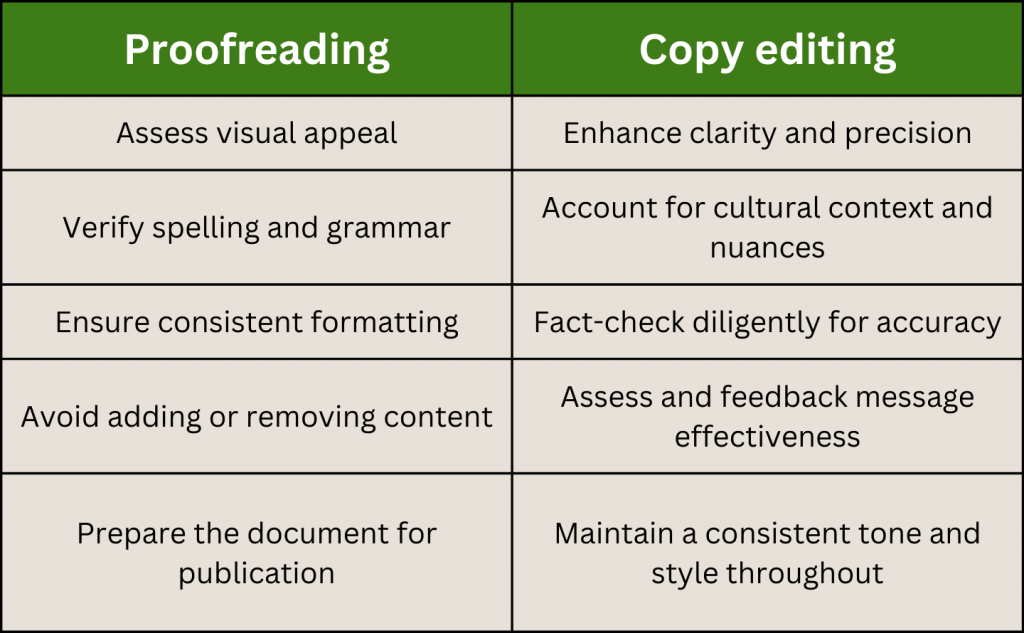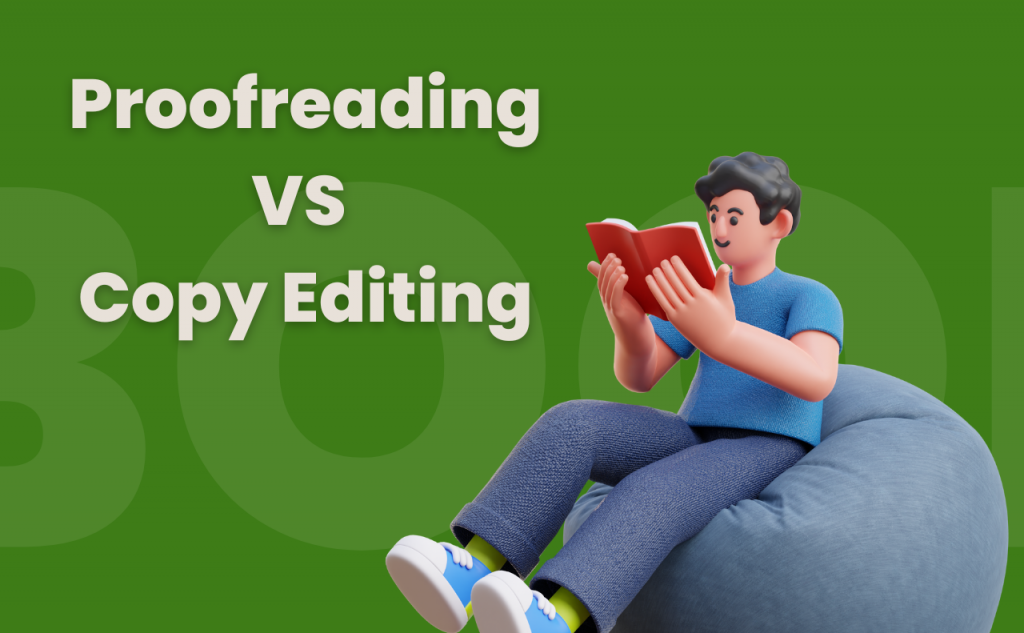Have you ever stumbled upon a typo or a grammatical error in an important document? It can be embarrassing and can undermine the credibility of your writing. That’s where copyediting and proofreading come into play. The first involves correcting grammar, punctuation, and style errors, while the second focuses on eliminating spelling and formatting mistakes. Despite their distinct roles, these two terms often need clarification, and the role of each is significant.
So, what is copy editing about?
Are you trying to determine who you need more ─ a proofreader vs copy editor? The difference between these concepts is based on the fact that a text is a unique piece. While creating a work, the author often focuses on ensuring that the content reflects specific thoughts. Therefore, the manuscript may contain several inaccuracies. At the same time, the task set before the editor is also responsible: to maintain the text readability while preserving the author’s style.
Perhaps you’ve seen a cartoon where the main character faced a choice of where to place a comma in the sentence «To execute, not to pardon». It is a great example of how the placement of just one symbol can affect the meaning (and, in this case, the outcome of the character’s story). Have you come across content that is difficult to comprehend? For instance, you may have met phrases on online stores that turned you off from purchasing.
Let us show a simple example.
✖️Before:
“Buy our products in our very best store. You will definitely be satisfied!”
✔️After:
“You are guaranteed quality purchasing products from our store.”
As you can see, errors can affect the reader’s perception, actions, or potential customers, even in such a short situation. Indeed, it’s essential to be concise and clear or ask for professionals, for example eBook editors‘, expertise in editing.
Why is proofreading always needed?
If you are trying to understand what is the difference between proofreading and copy editing, you need to know more about the next approach. Proofreading is a meticulous process of examining a written text to detect and rectify grammar, spelling, punctuation, and formatting errors. Tools like Grammarly or Hemingway Editor can be helpful in this stage, but they can’t replace the meticulous eye of a professional proofreader. It requires a thorough content review for consistency, clarity, and accuracy to ensure it is free from mistakes and reads fluently. Proofreading is vital in the writing process as it guarantees a polished and professional final document.
During the work, a skilled specialist checks resources and carefully reviews each sentence and word to identify and correct any mistakes (typos, missing or misused words, incorrect verb tenses, punctuation problems, etc.).
Moreover, this job is more than just checking for technical inconsistencies. It also involves reviewing consistency in formatting (e.g., headings, spacing, and font styles) to ensure the document is visually appealing and easy to read.
Let’s have a look on a short example below.
Text part by author: “The snow started falling outside. She said ‘the first snow’ turning to her companion”.
After assistance from the professional editors, the sentence is: “The snow started falling outside. “The first snow”, – she said, turning to her companion”.
Meanwhile, a specialist may work on a specific theme. For example, a children’s book editor will strive to preserve the enchanting story tone.
Core differences of copy editing VS proofreading

Main differences between proofreading and copy-editing
Understanding their main differences is essential to ensure your written work is polished and error-free (structure, senses, grammar).
No need to make a battle: proofread vs copy edit ─ both are important!
- Copy editing goes beyond proofreading and involves more in-depth editing to ensure the text’s consistency, clarity, and coherence. Copy editors play a crucial role in correcting grammar, punctuation, and style errors. They ensure your text adheres to established writing standards, such as those outlined in the APA Style Guide or the Chicago Manual of Style. Additionally, they scan for inconsistencies in style, tone, and language usage.
- They also focus on improving the overall flow and readability, ensuring it is engaging and coherent for the target audience. For instance, if you are writing a marketing brochure for your business, you may need somebody skilled to review and check the content to ensure it is polished and professional, with a consistent tone and style.
- Proofreading is the final stage of the editing process, where one carefully examines the text to identify and correct any errors before publishing it. For instance, before submitting a manuscript for printing or posting an article online, it is important to proofread the document to ensure it is free from any mistakes overlooked during the writing and revising process. It is crucial when writing a dissertation or any academic work ─ minor errors can negatively impact the credibility and quality of the final product too.
Real-life examples where editing, be it copy or line editing and proofreading, are used can vary widely, from academic papers and dissertations to business documents, marketing materials, websites, and more. Proofreading is often used when the content is complete and ready for publication. At the same time, copy editing is applied during the writing or revision process to improve document quality.
In most cases, it is best to trust book proofreading to a real expert. Still thinking, who wins in competition proofreading vs copy editing? Our team is skilled and ready to help with academic papers or other written content. Don’t let errors and inconsistencies undermine your work impact, contact PenFellow today!
FAQ
● Can the editors do proofreading?
Although obtaining a degree is not always mandatory, individuals working as professionals in the proofreading industry generally possess exceptional language skills, a meticulous eye for detail, and relevant experience or training in proofreading methodologies. Nevertheless, a degree in a relevant field can bolster their credentials and knowledge.
● Do proofreaders need education?
Even though a degree may not always be a requirement, professionals usually possess excellent language skills, a sharp eye for detail, and relevant training or experience in proofreading techniques. However, having a degree in a related field can further boost their expertise and qualifications.


